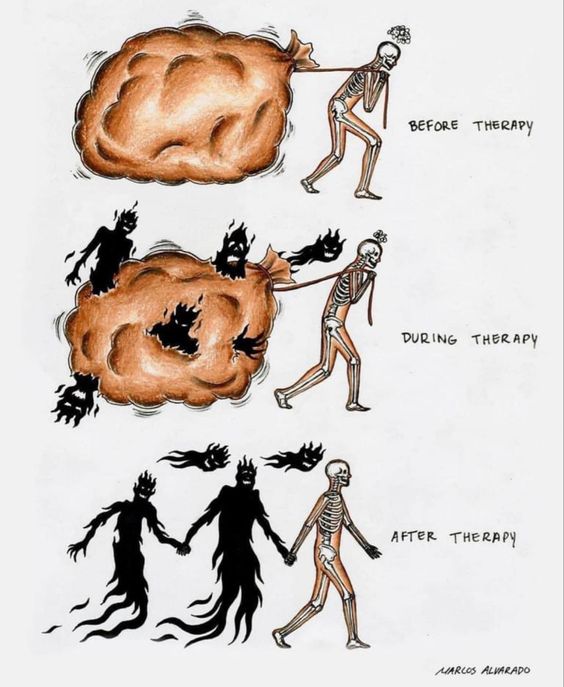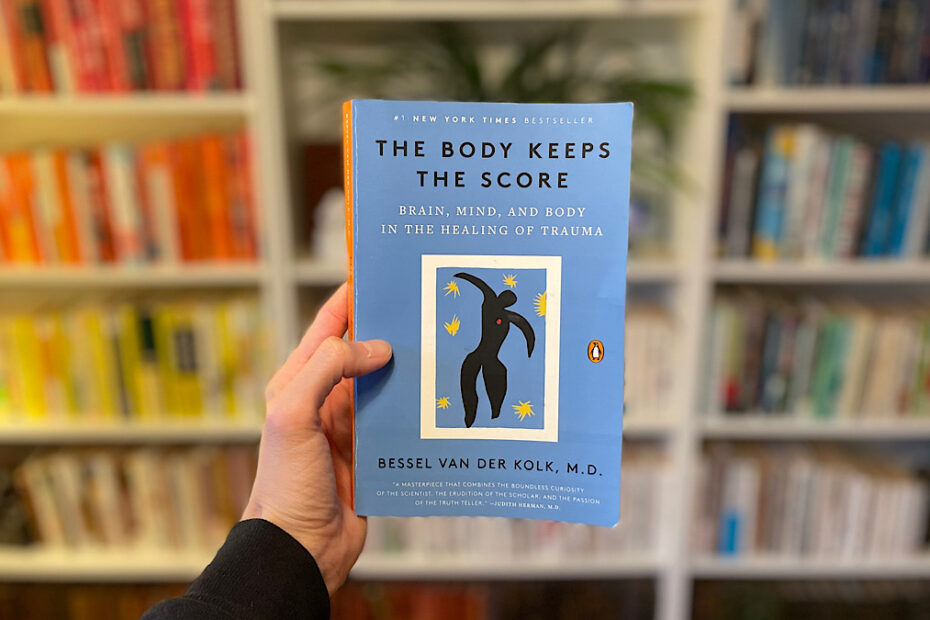“She would never be ashamed for her own nature. She would see the doctor. She would make an appointment and continue to do and take and try whatever they advised. She wouldn’t run from her pain any more. She wouldn’t poison herself with the pressures of imagined perfection. She would see her own hurt, recognise it, and not imagine there was a life of unquestionable positivity and happiness she was being deprived from. She would accept the darkness of life in a way she never had, not as failure but as part of a totality, as something that threw other things into relief, into growth, into being. The ash in the soil.”
Matt Haig, The Midnight Library (Page 285)
“The continuing struggle was once described in the following metaphor by a patient who had successfully completed a long course of psychotherapy: ‘I came to therapy hoping to receive butter for the bread of life. Instead, at the end, I emerged with a pail of sour milk, a churn, and instructions on how to use them.'”
Sheldon B. Kopp, If You Meet Buddha On The Road, Kill Him! (Page 138)
“When a psychotherapy patient does do the work of facing up to some of what he must endure, he is often rewarded by a sense of increased freedom and joy. However, as he comes to realize that there will be no light without some darkness, no rest without further toil, he may balk disappointedly to find that troubles never end. New solutions lead to new problems. New freedom leads to new responsibilities.”
Sheldon B. Kopp, If You Meet Buddha On The Road, Kill Him! (Page 136)
“[The patient] was sure that if he worked hard enough, suffered long enough, or (failing that) at least if he were to be rescued by me, then Nirvana could be his. He can bear his pain for a while if only someday, someway, he will be able to reach a state of blissful perfection, a time when he will have no more conflicts, anxieties, or uncertainties. As I come toppling down off the pedestal on which he has placed me, he is horrified to learn that enlightenment does not provide perfection. Instead, it simply offers the pedestrian possibility of living with the acceptance of imperfection.”
Sheldon B. Kopp, If You Meet Buddha On The Road, Kill Him! (Page 134)
“Patients are often disappointed to learn that I too wander unredeemed, that I am no better off than they are. Eventually, they may realize comfort implied in my turning out to be just another struggling human being. At least then I can bring a fellow-pilgrim sort of understanding to his journey. Recognition of my all-too-obvious fallibility can provide the relief of learning that some happiness is possible without his having to reach some state of perfection.”
Sheldon B. Kopp, If You Meet Buddha On The Road, Kill Him! (Page 134)
“The psychotherapy patient will have to learn to fend for himself, to become a lonely wayfarer whose whole life becomes one long, transforming pilgrimage. Being in treatment may show him the way he is to journey, but it will be up to him to reclaim his salvation continually by remaining on the march for the rest of his life.”
Sheldon B. Kopp, If You Meet Buddha On The Road, Kill Him! (Page 130)
“The only way to be saved is to spend your lifetime on a pilgrimage.”
Sheldon B. Kopp, If You Meet Buddha On The Road, Kill Him! (Page 128)
“As a therapist, I do not consider myself a ‘Shrink.’ I wish to help expand consciousness, not to diminish it. I am not interested in getting people to ‘adjust’ to our rather unsatisfactory culture. At the same time, I am not a ‘Radical Therapist’ preaching revolution and social change. Instead, I hope to help the pilgrims who seek my guidance to see that all rules are mere conventions, games that one can play or not. It is only necessary to recognize that they are games, to do what you wish, and to face the consequences of your behavior.”
Sheldon B. Kopp, If You Meet Buddha On The Road, Kill Him! (Page 117)
“When we lay claim to the evil in ourselves, we no longer need fear its occurring outside of our control. For example, a patient comes into therapy complaining that he does not get along well with other people; somehow he always says the wrong thing and hurts their feelings. He is really a nice guy, just has this uncontrollable, neurotic problem. What he does not want to know is that his ‘unconscious hostility’ is not his problem, it’s his solution. He is really not a nice guy who wants to be good; he’s a bastard who wants to hurt other people while still thinking of himself as a nice guy. If the therapist can guide him into the pit of his own ugly soul, then there may be hope for him. Once this pilgrim can see how angry and vindictive he is, he can trace his story and bring it to the light, instead of being doomed to relive it without awareness. Nothing about ourselves can be changed until it is first accepted.”
Sheldon B. Kopp, If You Meet Buddha On The Road, Kill Him! (Page 108)
“The patient/pilgrim insists that there must be some meaning that he just has not yet gotten hold of or else he would be happy. ‘Why?’ he asks. ‘Why did all this happen to me?’ He believes that if only he could understand, if only the therapist would explain it to him, then he could live with life as it is and be happy. But ‘the meaning of life can be revealed but never explained.’ The point is that there is no point. In a world of billion[s], countless numbers long dead and an infinite number yet to be born, how important are the momentary frustrations or satisfactions of any one of us?”
Sheldon B. Kopp, If You Meet Buddha On The Road, Kill Him! (Page 41)
“One of the luxuries of being a psychotherapist is that it helps to keep you honest. It’s a bit like remaining in treatment all of your life. It helps me to remain committed to telling and retelling my tale for the remainder of that pilgrimage that is my life. Research in self-disclosure supports my own experience that the personal openness of the guru facilitates and invites the increased openness of the pilgrim. But I operate not to help the patient, but to help myself. It is from the center of my own being that I am moved to share my tale. That it turns out to be so helpful to the patient is gravy.”
Sheldon B. Kopp, If You Meet Buddha On The Road, Kill Him! (Page 24)
“As a therapist, I know that though the patient learns, I do not teach. Furthermore, what is to be learned is too elusively simple to be grasped without struggle, surrender, and experiencing of how it is.”
Sheldon B. Kopp, If You Meet Buddha On The Road, Kill Him! (Page 7)
“Though the patient enters therapy insisting that he wants to change, more often than not, what he really wants is to remain the same and to get the therapist to make him feel better. His goal is to become a more effective neurotic, so that he may have what he wants without risking getting into anything new. He prefers the security of known misery to the misery of unfamiliar insecurity.”
Sheldon B. Kopp, If You Meet Buddha On The Road, Kill Him! (Page 4)
“The therapist is an observer and a catalyst. He has no power to ‘cure’ the patient, for cure is entirely out of his hands. He can add nothing to the patient’s inherent capacity to get well, and whenever he tries to do so he meets stubborn resistance which slows up the progress of treatment. The patient is already fully equipped for getting well.”
Sheldon B. Kopp, If You Meet Buddha On The Road, Kill Him! (Page 4)
40 Bessel van der Kolk Quotes on Trauma and Healing from The Body Keeps The Score
Excerpt: A deeply insightful collection of quotes on trauma and healing from one of the world’s foremost experts on trauma, Bessel van der Kolk.
Read More »40 Bessel van der Kolk Quotes on Trauma and Healing from The Body Keeps The Score
“Many psychiatrists today work in assembly-line offices where they see patients they hardly know for fifteen minutes and then dole out pills to relieve pain, anxiety, or depression. Their message seems to be ‘Leave it to us to fix you; just be compliant and take these drugs and come back in three months—but be sure not to use alcohol or (illegal) drugs to relieve your problems.’ Such shortcuts in treatment make it impossible to develop self-care and self-leadership.”
Bessel van der Kolk, The Body Keeps The Score (Page 351) | ★ Featured on this book list.
“Unlike his experience with the numerous therapists who had talked with him about how bad he felt, theater gave him a chance to deeply and physically experience what it was like to be someone other than the learning-disabled, oversensitive boy that he had gradually become. Being a valued contributor to a group gave him a visceral experience of power and competence. I believe that this new embodied version of himself set him on the road to becoming the creative, loving adult he is today.”
Bessel van der Kolk, The Body Keeps The Score (Page 333)
“If you are not aware of what your body needs, you can’t take care of it. If you don’t feel hunger, you can’t nourish yourself. If you mistake anxiety for hunger, you may eat too much. And if you can’t feel when you’re satiated, you’ll keep eating. This is why cultivating sensory awareness is such a critical aspect of trauma recovery. Most traditional therapies downplay or ignore the moment-to-moment shifts in our inner sensory world. But these shifts carry the essence of the organism’s responses: the emotional states that are imprinted in the body’s chemical profile, in the viscera, in the contraction of the striated muscles of the face, throat, trunk, and limbs. Traumatized people need to learn that they can tolerate their sensations, befriend their inner experiences, and cultivate new action patterns.”
Bessel van der Kolk, The Body Keeps The Score (Page 275) | ★ Featured on this book list.
“It is an enormous challenge to find safe places to express the pain of trauma, which is why survivor groups like Alcoholics Anonymous, Adult Children of Alcoholics, Narcotics Anonymous, and other support groups can be so critical. Finding a responsive community in which to tell your truth makes recovery possible. That is also why survivors need professional therapists who are trained to listen to the agonizing details of their lives.”
Bessel van der Kolk, The Body Keeps The Score (Page 246) | ★ Featured on this book list.

